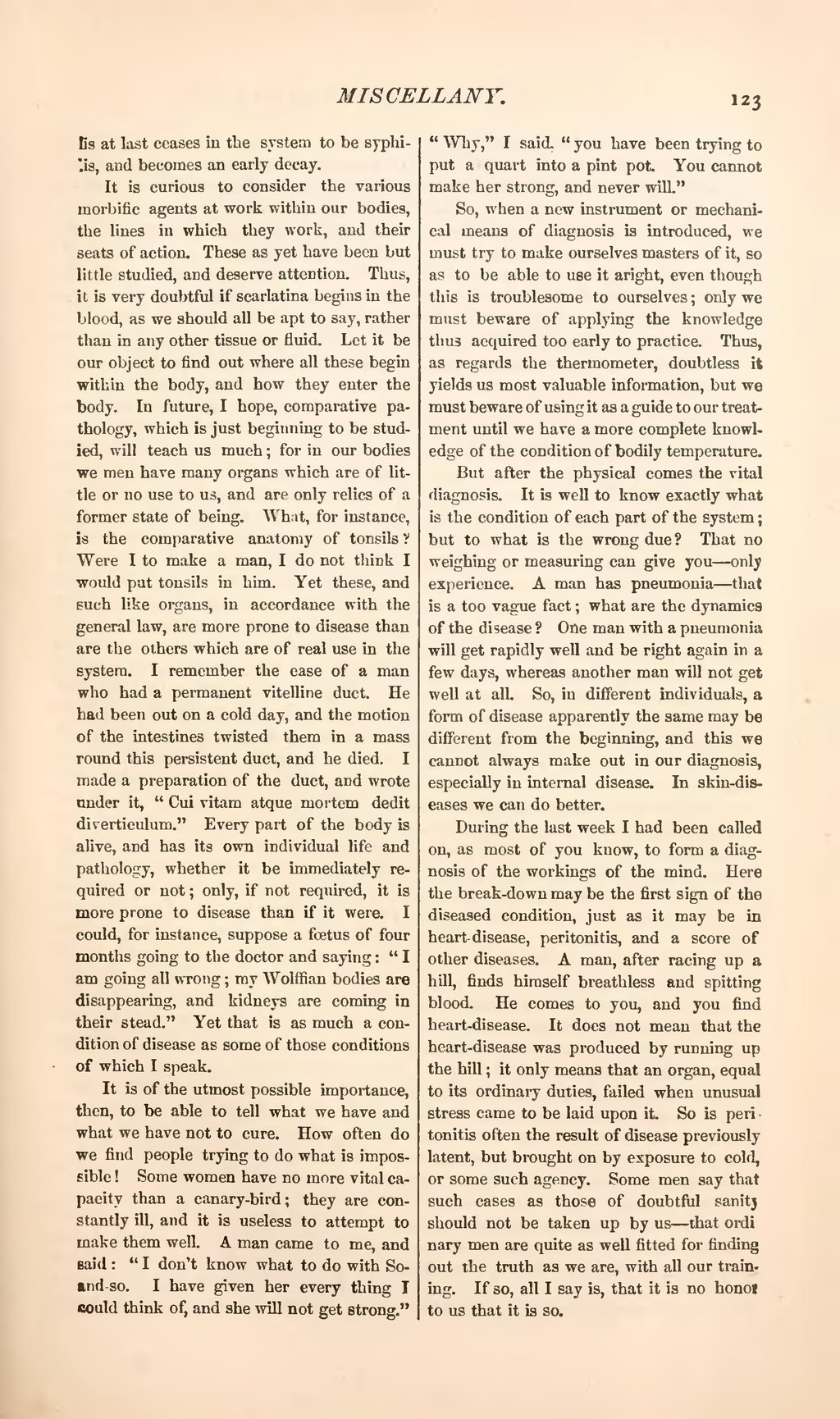is at last ceases in the system to be syphilis, and becomes an early decay.
It is curious to consider the various morbific agents at work within our bodies, the lines in which they work, and their seats of action. These as yet have been but little studied, and deserve attention. Thus, it is very doubtful if scarlatina begins in the blood, as we should all be apt to say, rather than in any other tissue or fluid. Let it be our object to find out where all these begin within the body, and how they enter the body. In future, I hope, comparative pathology, which is just beginning to be studied, will teach us much; for in our bodies we men have many organs which are of little or no use to us, and are only relics of a former state of being. What, for instance, is the comparative anatomy of tonsils? Were I to make a man, I do not think I would put tonsils in him. Yet these, and such like organs, in accordance with the general law, are more prone to disease than are the others which are of real use in the system. I remember the case of a man who had a permanent vitelline duct. He had been out on a cold day, and the motion of the intestines twisted them in a mass round this persistent duct, and he died. I made a preparation of the duct, and wrote under it, "Cui vitam atque mortem dedit diverticulum." Every part of the body is alive, and has its own individual life and pathology, whether it be immediately required or not; only, if not required, it is more prone to disease than if it were. I could, for instance, suppose a fœtus of four months going to the doctor and saying: "I am going all wrong; my Wolffian bodies are disappearing, and kidneys are coming in their stead." Yet that is as much a condition of disease as some of those conditions of which I speak.
It is of the utmost possible importance, then, to be able to tell what we have and what we have not to cure. How often do we find people trying to do what is impossible! Some women have no more vital capacity than a canary-bird; they are constantly ill, and it is useless to attempt to make them well. A man came to me, and said: "I don't know what to do with So-and-so. I have given her every thing I could think of, and she will not get strong." "Why," I said. "you have been trying to put a quart into a pint pot. You cannot make her strong, and never will."
So, when a new instrument or mechanical means of diagnosis is introduced, we must try to make ourselves masters of it, so as to be able to use it aright, even though this is troublesome to ourselves; only we must beware of applying the knowledge thus acquired too early to practice. Thus, as regards the thermometer, doubtless it yields us most valuable information, but we must beware of using it as a guide to our treatment until we have a more complete knowledge of the condition of bodily temperature.
But after the physical comes the vital diagnosis. It is well to know exactly what is the condition of each part of the system; but to what is the wrong due? That no weighing or measuring can give you—only experience. A man has pneumonia—that is a too vague fact; what are the dynamics of the disease? One man with a pneumonia will get rapidly well and be right again in a few days, whereas another man will not get well at all. So, in different individuals, a form of disease apparently the same may be different from the beginning, and this we cannot always make out in our diagnosis, especially in internal disease. In skin-diseases we can do better.
During the last week I had been called on, as most of you know, to form a diagnosis of the workings of the mind. Here the break-down may be the first sign of the diseased condition, just as it may be in heart-disease, peritonitis, and a score of other diseases. A man, after racing up a hill, finds himself breathless and spitting blood. He comes to you, and you find heart-disease. It does not mean that the heart-disease was produced by running up the hill; it only means that an organ, equal to its ordinary duties, failed when unusual stress came to be laid upon it. So is peritonitis often the result of disease previously latent, but brought on by exposure to cold, or some such agency. Some men say that such cases as those of doubtful sanity should not be taken up by us—that ordinary men are quite as well fitted for finding out the truth as we are, with all our training. If so, all I say is, that it is no honor to us that it is so.
